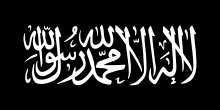Histopathology image classification: Highlighting the gap between manual analysis and AI automation
Contents



The jihadist flag is a flag commonly used by various Islamist and Islamic fundamentalist movements as a symbol of jihad. It usually consists of the Black Standard with a white text of the Shahada (Islamic declaration of faith) emblazoned across it in Arabic calligraphy. Its usage was widely adopted by Islamist groups and jihadists during the 1990s and early 2000s.[1][2]
Organizations which have used such a flag include:
- Al-Qaeda
- Islamic State
- Al-Shabaab
- Mujahideen
- Taliban
- Palestinian Islamic Jihad
- Hamas
- Jemaah Islamiyah[3]
Muqwaki seal variant

The variant used by the Islamic State, al-Qaeda in the Arabian Peninsula, al-Qaeda in the Islamic Maghreb, Islamic State of Iraq, and al-Shabaab depicts the Muqwaki variant of the alleged seal of Muhammad,[5] which scholars consider to be an anachronistic forgery.
In August 2014, British Prime Minister David Cameron suggested that anybody displaying "the Islamic State flag" in the United Kingdom should be arrested.[6] Citing the Terrorism Act 2000, section 13 (1b) of the act states "[a] person in a public place commits an offence if he wears, carries or displays an article in such a way or in such circumstances as to arouse reasonable suspicion that he is a member or supporter of a proscribed organisation" and can face six months in prison or a statutory fine.[7]
It has also been banned from public demonstration in the Netherlands since August 2014.[8]
The use of the image of the Seal of Muhammad Jihadist Flag "ISIS flag" (but not other versions of the Black Standard) for non-educational purposes has been forbidden in Germany by the Federal Ministry of the Interior since September 2014.[9][10] Neighbouring Austria proposed a ban in the same month.[11]
See also
References
- ^ Hamid, Shadi; Dar, Rashid (July 15, 2016). "Islamism, Salafism, and jihadism: A primer". Brookings. Retrieved 2022-09-10.
- ^ Prusher, Ilene (2014-09-09). "What the ISIS Flag Says About the Militant Group". Time. Retrieved 2022-09-10.
- ^ Andre, Virginie (2012). "'Neojihadism' and YouTube: Patani Militant Propaganda Dissemination and Radicalization". Asian Security. 8 (1). Informa UK Limited: 27–53. doi:10.1080/14799855.2012.669207. hdl:10536/DRO/DU:30064350. ISSN 1479-9855. S2CID 58924566.
- ^ "What the words on Isis' flag mean". Independent.co.uk. 6 July 2015.
- ^ The SITE (Search for International Terrorist Entities) website on 23 January 2007 stated: "The Islamic State of Iraq issued a document titled: 'The Legality of the Flag in Islam,' which contains the image of its flag and information to its symbolism, today, Tuesday, January 23, 2007. Text on the flag reading, 'No God, but Allah, and Muhammad is Allah's Messenger,' are the words contained on the flag of the Prophet Muhammad that he carried into battle and handed to generations of bearers. The Islamic State provides evidence and legitimacy for this banner from Islamic scholars, and goes into detail regarding opinions of the flag's material, title, and significance. According to the group the circular shape matches the ring stamp of the Prophet found on many scripts, and the order of the words are to indicate the supremacy of Allah over the Messenger." Cited by Ivan Sache at Flags of the World on 18 February 2007.[1]
- ^ "Iraq crisis: Cameron warns of possible IS threat to UK". BBC News. 16 August 2014. Retrieved 17 August 2014.
- ^ "Terrorism Act 2000". legislation.gov.uk. 20 July 2000.
- ^ Cluskey, Peter (2 August 2014). "Dutch ban display of Isis flag in advance Amsterdam march". Irish Times. Retrieved 19 November 2014.
- ^ Eddy, Melissa (12 September 2014). "Germany Bans Support for ISIS". The New York Times. Retrieved 19 November 2014.
- ^ "Germany 2014 human rights report - US Department of State" (PDF). state.gov. United States Department of State. 2014. p. 11. Retrieved September 11, 2018.
On September 12 (2014), the Federal Interior Ministry banned any activities of the Islamic State of Iraq and the Levant (ISIL), including recruitment, fundraising, and the use of the group's symbols under the name "Islamic State" (German: Islamischer Staat), such as the black flag bearing ISIL's name.
- ^ "Austria bans Isis terror symbols". The Local. 12 September 2014. Retrieved 19 November 2014.
External links
- Collection of imagery of black flags used in Islamic extremism
- The Black Flag (al-raya) at The Islamic Imagery Project, The Combating Terrorism Center at West Point
- The Semiotics of a Black Flag (makingsenseofjihad.com)
- Usama Hasan, The Black Flags of Khurasan (unity1.wordpress.com)

















